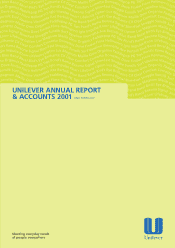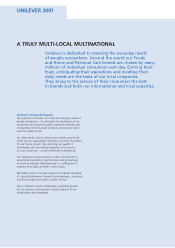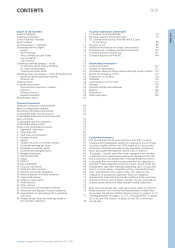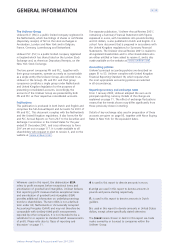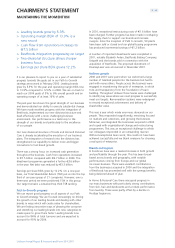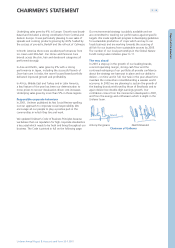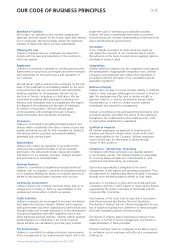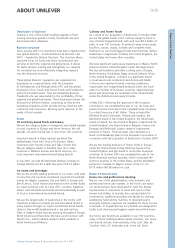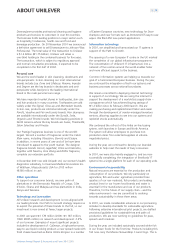Unilever 2001 Annual Report Download - page 12
Download and view the complete annual report
Please find page 12 of the 2001 Unilever annual report below. You can navigate through the pages in the report by either clicking on the pages listed below, or by using the keyword search tool below to find specific information within the annual report.
Unilever Annual Report & Accounts and Form 20-F 2001
ABOUT UNILEVER >9
Report of the Directors
another step towards our target of sourcing all fish from
sustainable stocks by 2005.
In water care, we continued to work to secure safe,
sustainable water resources. We published, and widely
promoted, the SWIM (Sustainable Water and Integrated
Catchment Management) guidelines. These provide a
practical framework for working with partners on water
stewardship schemes.
In 2000, which is the most recent year for which we have
data, our targets on environmental management were
largely achieved. We continued to reduce the environmental
impact of all our key performance indicators, including
water, energy and carbon dioxide. We met four of six
challenging eco-efficiency targets in our manufacturing
operations. This was achieved with an increase in production
tonnage. During 2001, we introduced new software tools
to allow us to collect and publish environmental data
more swiftly.
Operational responsibility for environmental issues rests with
the operating companies and with individuals responsible for
the particular Unilever facility. They are supported by our
environmental decision-making committee, the Unilever
Environment Group (UEG). This is Unilever’s leading body for
making recommendations addressing environmental issues.
It is chaired by the Corporate Development Director and
made up of representatives from Business Groups and
safety, health and environmental experts. Its role is to
develop strategies to continuously improve Unilever’s
environmental performance and to communicate its
recommendations to Unilever facilities worldwide.
In pursuing our environmental strategy, we work closely
with external interest groups. For example, our sustainable
agriculture initiative is based on performance indicators
devised following extensive stakeholder involvement and its
progress is monitored by an independent board of experts.
Our sustainable fish and water care initiatives are also rooted
in partnerships.
For the third consecutive year we topped our industry sector
in the Dow Jones Sustainability World Indexes.
Our Environment Report is available at www.unilever.com .
Responsible corporate behaviour
Responsible corporate behaviour is central to Unilever’s
business management and is part of the remit of our
Corporate Development Director.
In 2001, we made our approach to corporate social
responsibility more explicit with the publication of our
first international Social Review, which can be viewed at
www.unilever.com . The review maps out how we interact
with society and the many different stakeholders with an
interest in our business. Learning from this first Review,
and from the many reporting initiatives in this area, work
is underway to update the information during 2002.
Unilever’s commitment to high standards of corporate
behaviour is spelt out in our Code of Business Principles,
which is set out on page 6. The Code sets the framework
for our operational standards, covering issues such as
employee health and safety, product quality, relations with
governments, ethical behaviour and environmental impact.
It is applicable worldwide and is designed to have practical
value to our employees in the day-to-day management of
our business: each employee must follow these principles
in the spirit as well as the letter. In 2001, we updated the
Code in line with the evolving standards expected of
international companies. The new Code is being rolled
out in 2002.
Debate about the appropriate extent of corporate social
responsibility has continued. By meeting the needs of
consumers worldwide, Unilever’s branded products and
services help to raise living standards and improve quality
of life. Our operations add value by efficiently processing
raw materials and effectively marketing and distributing
our brands. This value is then shared among our many
stakeholders worldwide including shareholders, employees,
suppliers and governments. Communities also benefit
through our voluntary contributions. In 2001, we spent
approximately 57 million on community programmes,
focusing on projects that improve healthcare, raise levels
of education and encourage local economic, environmental
and cultural activity.
Competition
We have a wide and diverse set of competitors in our
consumer goods businesses. Many of our competitors
also operate on an international scale, but others have
a narrower regional or local focus.
Competition is intense and challenging. We aim to
compete and give value to our consumers and customers
in three ways:
> by continually developing new and improved products;
> by sharing our innovations and concepts with our
businesses all around the world; and
> by striving to lower the cost of our sourcing,
manufacturing and distribution processes whilst still
maintaining, and improving, the quality of our products.
We support efforts to create a more open competitive
environment through the liberalisation of international
trade. We also support the fuller implementation of the
Single European Market and inclusion of other European
countries in the European Union.
Exports
We sell our products in nearly all countries throughout
the world and manufacture in many of them. Inside the
European Union we make many of our products in only
a few countries, for sale in all of them.
We also export a wide range of products to countries
where we do not make them. We often use this export
trade to develop new markets before building local
manufacturing facilities, usually through our facilities
in neighbouring countries.


